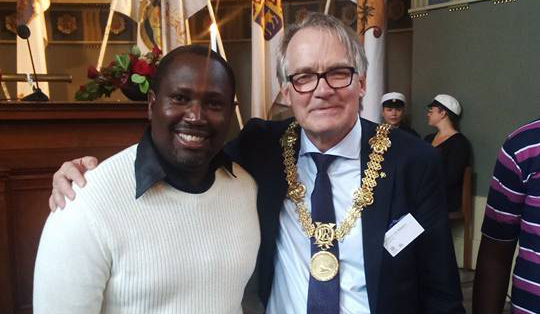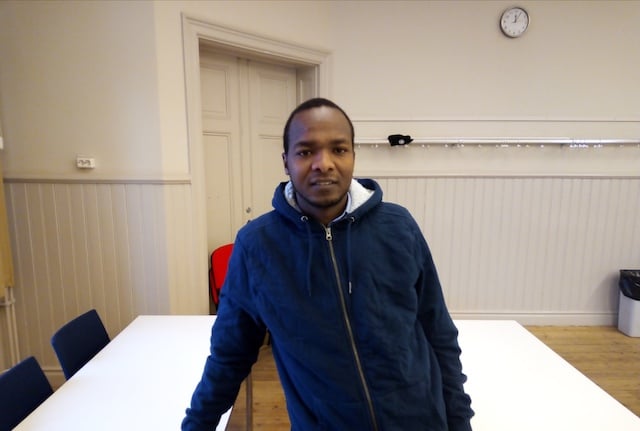Firstly, why did you decide to come to Sweden on an SI scholarship?
Sweden is home to some of the world’s best universities with an excellent learning environment – it’s a centre of excellence in higher education.
I wanted to become part of this tradition of academic excellence. The SI scholarship has given me a life-changing opportunity to enable me to achieve my academic and professional goals. I am so happy to be associated with Lund University with assistance from the Swedish Institute.
What made you decide to run for a position on the Graduate School Board at Lund University?
I am a leader and always strive to become a better leader. I am a person who thinks the world is yawning for better leadership from all angles of life. I also like to learn new things and sometimes make comparisons between my home country and Sweden for example.
I noticed early on that students in Sweden learn life skills including leadership at their schools through associations, networking events, students’ fairs and nations among other. It did not take me long to realize that I had a lot to learn from my fellow students.
Most importantly, I considered my role on the Graduate School Board as a leadership learning opportunity and I am convinced that I will improve my leadership skills from the Graduate School Board experience
Describe the selection process. How were you chosen?
The Student Union has the right to elect or appoint a Student Representative to the Board. An announcement was made by the Student Union and I expressed interest in the position of Student Representative on the Graduate School Board.
Later, I received an email acknowledging receipt of my application and explaining the Board would meet on October 18th and that I should expect to hear from the Student Union the following day.
I then became engaged with my academic work and the next email I received was one congratulating me upon my election to the position of Student Representative to the Graduate School Board.
How did it felt when you learned you had been selected?
The news came as a surprise to me because I was not thinking about the results at that particular time. I definitely was excited and happy with myself for yet another position of responsibility. I shared the information with two of my corridor mates and inspired them to look out for such opportunities.
I still feel good that I kept my word to myself. When writing my motivation letter for the SI scholarship I promised myself that I would seek any leadership roles at my university so that I can continue to improve on my leadership skills. This is exactly what I envisaged and I hope I will continue to be active.
What does the Graduate School Board do? What are your responsibilities?
The Graduate School Board consists of a chairperson and six commissioners, three pogramme directors, and two or three student representatives elected by the student union at Lund University.
Among other things, it governs the three programmes organized by the graduate school: Gender Studies; Development Studies; and Global Studies. The Board decides the course content and syllabi. It is also charged with providing a positive learning environment and support for international students and all the other students who are undertaking the graduate school courses.
As a Student Representative, I represent the Student Union and the Students at the Faculty of Social Sciences. I speak for them and defend their rights as students.
I will take part in the Graduate Board meetings and activities like education planning and influencing course syllabi, literature lists, pedagogies, equality, quality, work and study environments. I have the right to vote and my vote carries the same weight as that of any staff member on the Board.
What do you hope to accomplish while you serve on the board?
I hope to serve as a meaningful representative of the students because according to Swedish law, students have a right to be represented. I hope to continue to advance students’ voice and guard students’ rights that are enshrined in the List of Rights and the Act of Higher Education. I will ensure continuity and a good working relationship with the Board and its members and the Student Union especially when dealing with issues that are a threat to the students’ rights.
What message would you send to other NFGL members looking for ways to get involved at their schools?
SI has offered all scholarship holders a global platform to network and help devise solutions to global challenges. As NFGL members, the standard is set and the bar is high.
We need to be vigilant and very proactive. We need to get involved and participate. We need to demonstrate that we are up for the challenge of offering global leadership in the future. The future starts now.
Getting involved and starting to participate now offers NFGL members valuable experience that we can carry to our future jobs or and keep with us for a lifetime. There are a lot of opportunities to learn about leadership outside of class work.
I encourage all NFGL members to pick these low-hanging opportunities in their respective universities and make a contribution to their respective societies while benefiting from the leadership knowledge and experiences.

Andrew Martin Niwagaba is from Uganda and is pursuing an MSc. In Development Studies at Lund University.



 Please whitelist us to continue reading.
Please whitelist us to continue reading.